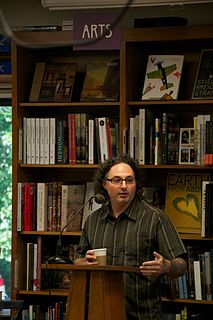A Quote by Tavis Smiley
Jamestown changed the world in many ways, but perhaps it shaped our nation most profoundly the day Africans arrived. I can't think of a more relevant place to talk about the issues facing our community today than the place where African culture became American culture.
Related Quotes
But that Franklin trip changed me profoundly. As I believe wilderness experience changes everyone. Because it puts us in our place. The human place, which our species inhabited for most of its evolutionary life. That place that shaped our psyches and made us who we are. The place where nature is big and we are small.
This country of ours has more wealth than any nation, but that's not what makes us rich. We have the most powerful military on Earth, but that's not what makes us strong. Our universities and our culture are the envy of the world, but that's not what keeps the world coming to our shores. Instead, it is that American spirit - that American promise - that pushes us forward even when the path is uncertain; that binds us together in spite of our differences; that makes us fix our eye not on what is seen, but what is unseen, that better place around the bend.
Humans are particularly interesting; our culture is incredible, there's no doubt about that. In many respects, no other species matches ours. But in quite a few respects, they do, and that can help us, perhaps, to better understand our own culture. We look at the ways humans are similar to other animals, and at the ways they differ, rather than just saying, "We have culture and you don't."
For the first time since I began acting, I feel that I've found my place in the world, that there's something out of my own culture which i can express and perhaps help others preserve..i have found out now that the African natives had a definite culture a long way beyond the culture of the Stone age...an integrated thing, which is still unspoiled by western influences...I think the Americans will be amazed to find how many of the modern dance steps are relics of African heritage.
You could perhaps better tell the story of a place by writing of a tiny village as a sort of prism into the bigger issues the culture was facing. It struck me as a better way to learn about a place, or at least a different way, than just going to interview the president. So I have often tried to tell the story of a place through people there. But I'm just amazed.
The church must seek to be biblical rather than relevant. We are not going to leave a mark upon our culture because we have studied its ways and adapted ourselves to it. We are relevant when we reject the world outright and are its polar opposite! This present darkness provides a great opportunity for the church to be the salt of the earth, but if we mix with the very impurities we are supposed to expose... we are as useless as our culture already believes us to be.
On to the Next Dream became about much more than me facing a challenging situation; it became about how all of us feel when we're thrust unexpectedly into change. It's about how we all hold onto personalized visions of our lives, our city, and our culture, and what we do when reality forces us to confront the impermanence of those visions.
Now more than ever, as the role of memory in our culture erodes at a faster pace than ever before, we need to cultivate our ability to remember. Our memories make us who we are. They are the seat of our values and source of our character. Competing to see who can memorize more pages of poetry might seem beside the point, but it's about taking a stand against forgetfulness, and embracing primal capacities from which too many of us have became estrangedmemory training is not just for the sake of performing party tricks; it's about nurturing something profoundly and essentially human.
The foreign audiences are somewhat surprised and happy to find an American film that asks questions about American culture. There's a certain kind of cultural imperialism that we practice. Our films penetrate every market in the world. I have seen and have had people reflect to me, maybe not in so many words or specifically, but I get the subtext of it - they're somewhat charmed and surprised and happy to see an American film reflect on our culture. Because they see other cultures reflect on our culture but they don't see US culture reflecting on itself in quite the same way.
A good part of 'The Information' is about the transition from an oral to a literary culture. Books effected such a great transformation in the way we think about the world, our history, our logic, mathematics, you name it. I think we would be greatly diminished as a people and as a culture if the book became obsolete.



































